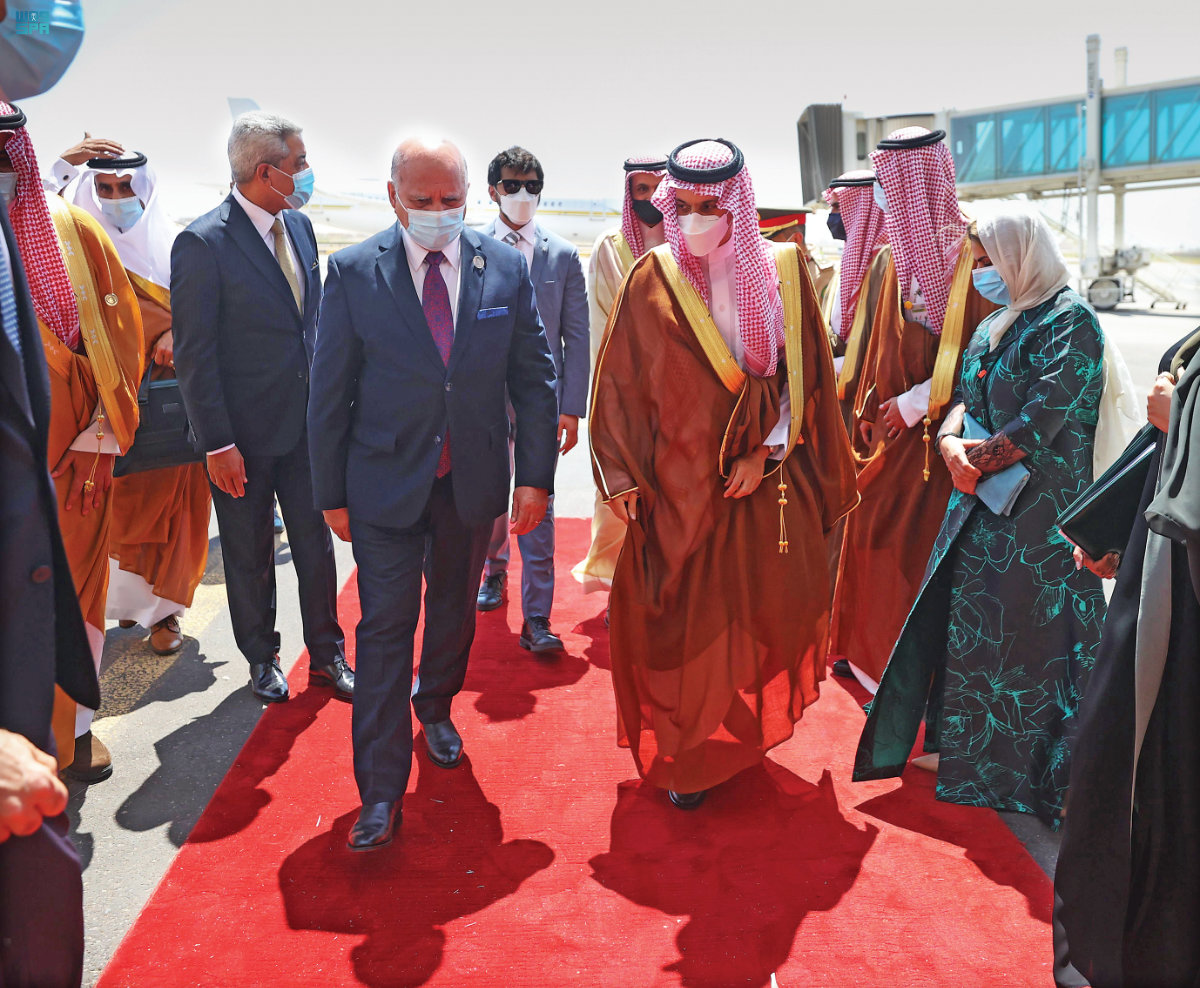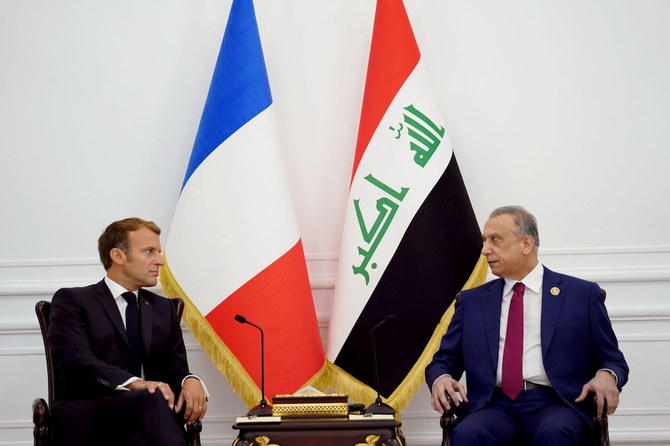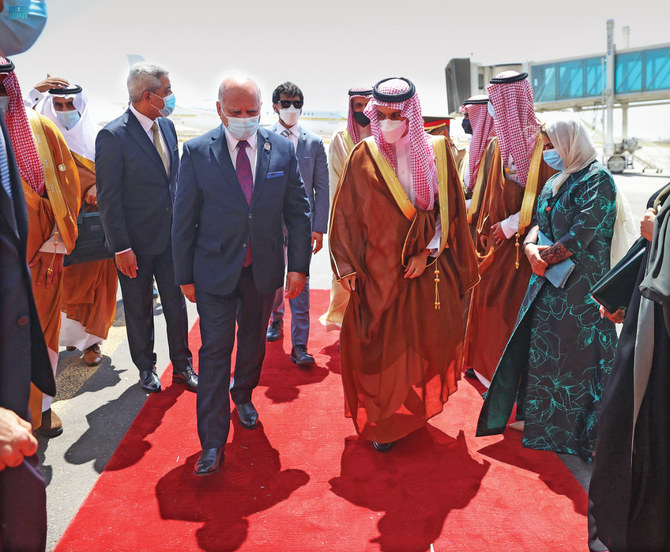AMMAN: Arab leaders and senior officials held rare talks on Saturday at a conference hosted by Iraq aimed at easing Middle East security tensions.
The Saudi delegation was led by Foreign Minister Prince Faisal bin Farhan, who said the Kingdom would continue to work to enhance Iraq’s security and stability, and preserve its institutions.
Prince Faisal said Saudi Arabia continued to cooperate with Iraq and partner countries in the region to confront the threat of terrorism, and supported Baghdad’s efforts to cooperate with the international coalition to confront the remnants of Daesh.
The minister took part in talks with Egyptian President Abdel Fattah El-Sisi, King Abdullah of Jordan, and Sheikh Tamim bin Hamad Al-Thani, the emir of Qatar.
The UAE and Kuwait were represented by their prime ministers, and Iran and Turkey by their foreign ministers.
The high-level meeting sent a message of Arab solidarity with Iraq. Macron, whose country is co-organizing the meeting, described Saturday’s meeting as “historic,” showcasing Iraq’s return to stability following the ruinous war against the Daesh group, which was defeated in 2017.

Saudi Foreign Minister Prince Faisal bin Farhan being received by his Iraqi counterpart Fuad Hussein in Baghdad on Saturday. (SPA)
“Iraq, which for years has been a headline for war and conflicts, is hosting leaders and representatives of the region today to affirm their support for Iraqi sovereignty and prosperity,” said President Barham Salih.
French President Emmanuel Macron also attended the Baghdad meeting, and said France would continue to deploy troops in Iraq to battle terrorism even if the US withdrew.
“We all know that we must not lower our guard, because Daesh remains a threat, and I know that the fight against these terrorist groups is a priority of your government,” Macron told Iraqi Prime Minister Mustafa Al-Kadhimi.
Participants in the summit also discussed the regional water crisis, the war in Yemen and the economic and political crisis that has brought Lebanon to the point of collapse. However, analysts said the meeting’s major significance was that it took place at all.
“This summit marks the return of Iraq as a pivotal player in the region,” said Ihsan Al-Shammari, head of the Iraqi Political Thinking Center in Baghdad. “Having rival parties seated at the same table is a significant step in that direction.”
Mamdouh Al-Abadi, Jordan’s former deputy prime minister, told Arab News that “even the least important meetings” between leaders were “better than no meetings.”
“One should not minimize the personal chemistry and relations that are developed in such meetings, and their effect on lowering tensions,” he said.
However, Al-Abadi warned against too much optimism. “If the Syrians are invited and attend the summit, then it would be a game changer,” he added.
Boost for Iraqi PM
He further said that the summit will be a boost to Iraqi PM Al-Kadhimi, who is facing a tough domestic political battle after a campaign announcement by firebrand populist Shiite leader Muqtada Sadr.
On Friday, Sadr reversed his decision to boycott the October elections and said that his movement would take part in order to “end corruption.”
“This summit marks the return of Iraq as a pivotal player in the region.”
Ihsan Al-Shammari, head of the Iraqi Political Thinking Center in Baghdad
Adnan Abu Odeh, former adviser to Jordan’s King Hussein and King Abdullah, told Arab News that the regional meeting is largely about Iran.
“When regional and world leaders meet, the main issue is usually a regional one, and in this case, Iran and its relations with other countries will most likely be the focus.”
Abu Odeh said that the foreign policy of US President Joe Biden “has made Arab leaders worried — if you can’t depend on the Americans, you start looking for regional solutions.”
Reem Badran, a former parliamentarian in Jordan, told Arab News that “any meeting of regional leaders gives us hope.
“We are always optimistic when leaders meet,” she said, adding: “The new situation is no different. On the economic level, we are hopeful that these summit meetings can be translated into economic stability, especially if major energy and transport projects can be carried out.”
Badran, who now runs a business, Al-Hurra Project Management, and is active in women’s microbusiness financing, said that an improvement of the economic situation would also have a direct effect on women “who are paying the highest price among all segments of our society.”
Tagreed Odeh, Middle Eastern Studies program coordinator at the Council on International Educational Exchange, said that the Baghdad summit is “a golden opportunity to widen space for dialogue with the aim of putting out the regional fires that have consumed the Middle East.”
Odeh said that the key to the success of the summit is “the fact that the host country, Iraq, has declared its willingness to prepare all that is required to have a welcoming atmosphere for all participants.”
Economic reporter Salameh Derrawi said that while the attendees are diverse, the key players are the Jordanians, Egyptians and Iraqis. “The leaders of those three countries have been working hard on finalizing regional projects in the areas of energy, oil pipelines and tax-free industrial zones.”


























